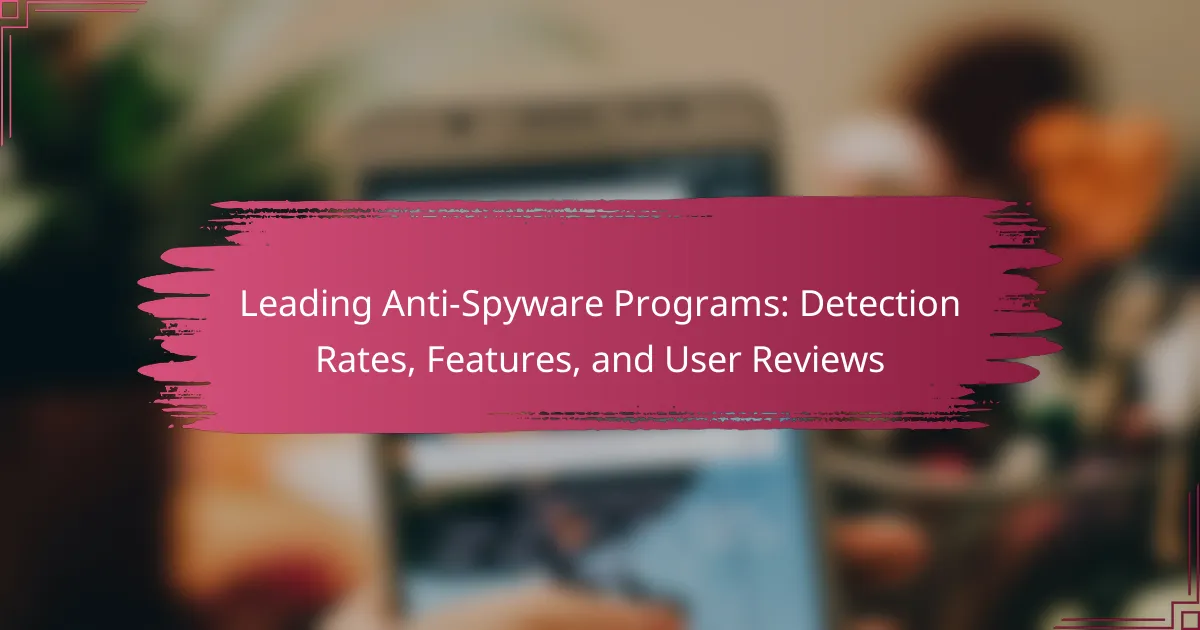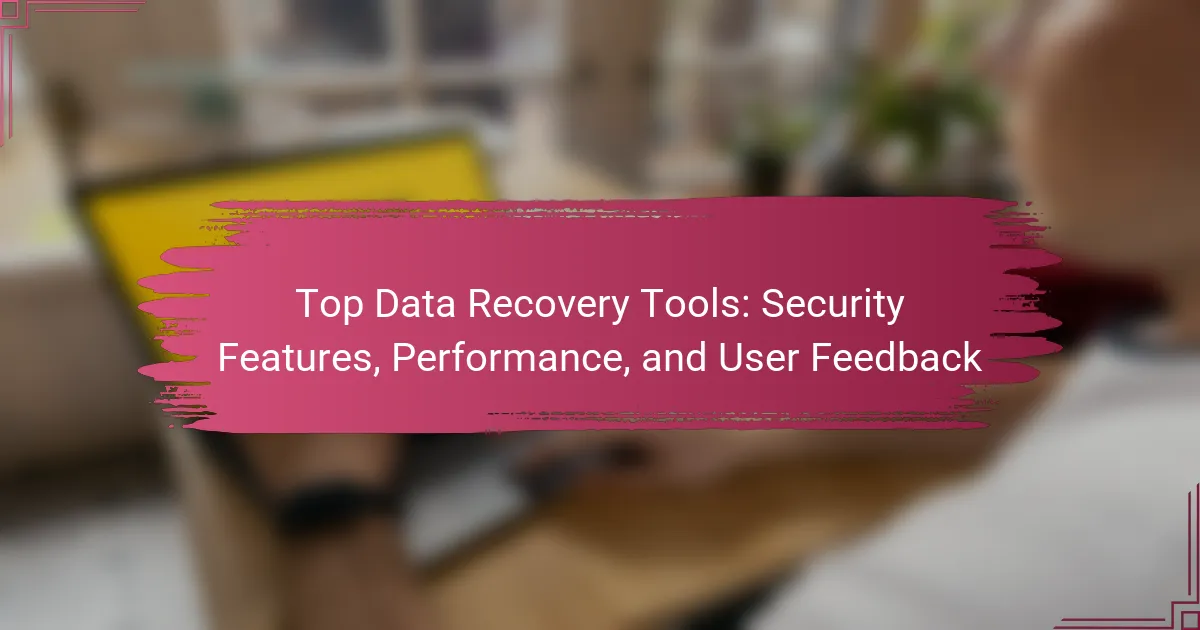Advanced Encryption Software is designed to secure data by converting it into a coded format, protecting it from unauthorized access. It employs advanced encryption algorithms, such as AES (Advanced Encryption Standard), which ensure that intercepted data remains unreadable without the correct decryption key. Common methods used in this software include symmetric encryption, asymmetric encryption, and hashing, each serving distinct purposes in data protection. This software is widely utilized across personal, corporate, and government sectors for applications like file encryption, secure email communications, and protecting data in cloud services. The article will explore the methods, benefits, and various use cases of Advanced Encryption Software, highlighting its critical role in safeguarding sensitive information.
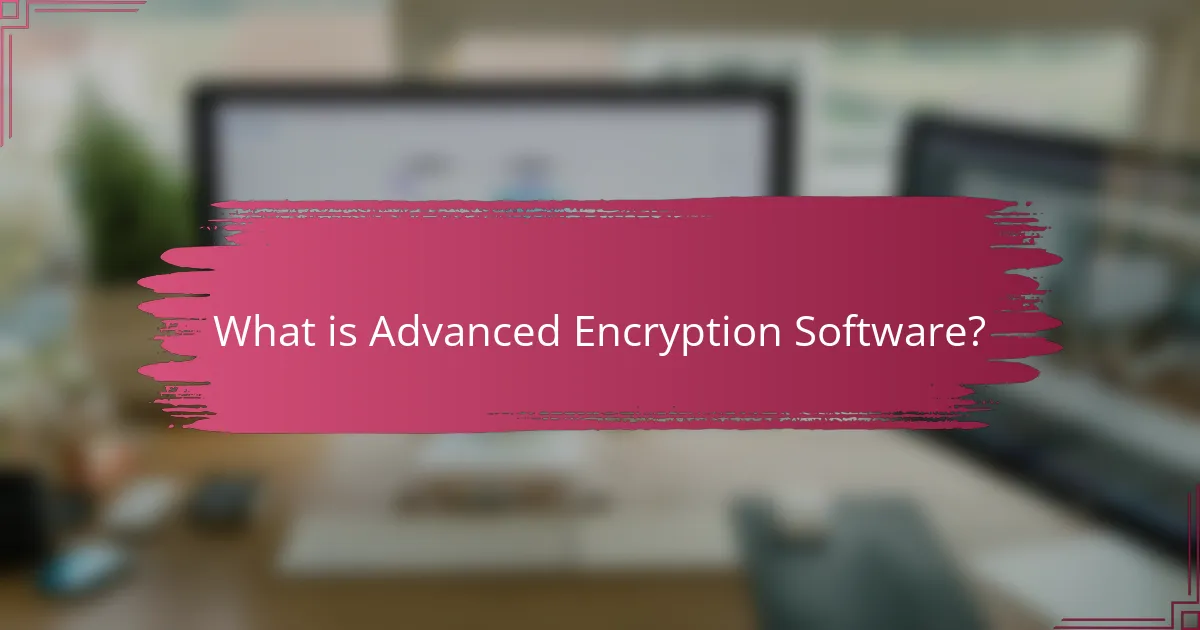
What is Advanced Encryption Software?
Advanced encryption software is a type of program designed to secure data by converting it into a coded format. This process protects information from unauthorized access. Advanced encryption algorithms, such as AES (Advanced Encryption Standard), are commonly used in this software. These algorithms ensure that even if data is intercepted, it remains unreadable without the correct decryption key. The software is utilized in various applications, including secure communications and data storage. According to the National Institute of Standards and Technology, AES is widely recognized for its strength and efficiency in protecting sensitive information.
How does Advanced Encryption Software function?
Advanced Encryption Software functions by converting plaintext into ciphertext using algorithms and keys. The encryption process utilizes mathematical transformations to secure data. Users input a key, which is essential for the encryption and decryption processes.
Common algorithms include AES (Advanced Encryption Standard) and RSA (Rivest-Shamir-Adleman). AES operates on fixed block sizes and uses symmetric keys, while RSA employs asymmetric keys for secure communication.
Once data is encrypted, it becomes unreadable without the correct key. This ensures confidentiality and protects sensitive information from unauthorized access. According to the National Institute of Standards and Technology (NIST), AES is widely adopted due to its efficiency and security.
What are the key algorithms used in Advanced Encryption Software?
The key algorithms used in Advanced Encryption Software include AES, RSA, and DES. AES, or Advanced Encryption Standard, is widely used for secure data encryption. It operates on fixed block sizes of 128 bits and supports key sizes of 128, 192, and 256 bits. RSA, or Rivest-Shamir-Adleman, is an asymmetric encryption algorithm that relies on the mathematical properties of large prime numbers. It is commonly used for secure data transmission. DES, or Data Encryption Standard, was once a widely used symmetric-key algorithm but is now considered outdated due to its short key length of 56 bits. These algorithms are foundational in ensuring data confidentiality and integrity in various applications.
How do these algorithms ensure data security?
Algorithms ensure data security through encryption techniques. These techniques transform readable data into an unreadable format. Only authorized users with the correct decryption key can access the original data. Common encryption algorithms include AES, RSA, and Blowfish. AES uses a symmetric key, making it fast and efficient for large data sets. RSA relies on asymmetric keys, providing a secure method for key exchange. These algorithms utilize complex mathematical functions to prevent unauthorized access. For example, AES has been extensively analyzed and is widely adopted for securing sensitive information.
What are the primary benefits of using Advanced Encryption Software?
The primary benefits of using Advanced Encryption Software include enhanced data security and protection against unauthorized access. This software encrypts sensitive information, making it unreadable without the correct decryption key. It safeguards data during transmission and storage, reducing the risk of data breaches. Advanced Encryption Software also ensures compliance with regulations such as GDPR and HIPAA, which mandate data protection measures. Additionally, it provides peace of mind for individuals and organizations, knowing their information is secure. Studies show that organizations utilizing encryption experience fewer data breaches, reinforcing its effectiveness in protecting sensitive information.
How does Advanced Encryption Software protect sensitive information?
Advanced Encryption Software protects sensitive information by converting it into unreadable code for unauthorized users. This process is known as encryption. It utilizes algorithms and keys to secure data. Only individuals with the correct decryption key can access the original information.
For example, AES (Advanced Encryption Standard) is widely used for its strong security. It employs symmetric key encryption, meaning the same key is used for both encryption and decryption. This method ensures that even if data is intercepted, it remains protected.
Studies show that encryption significantly reduces the risk of data breaches. According to a report by Verizon, 80% of data breaches involve unencrypted data. Thus, using advanced encryption software is crucial for safeguarding sensitive information.
What impact does Advanced Encryption Software have on compliance and regulations?
Advanced Encryption Software significantly enhances compliance with regulations. It protects sensitive data, ensuring adherence to laws like GDPR and HIPAA. By encrypting data, organizations mitigate risks of unauthorized access and data breaches. This protection is crucial for maintaining customer trust and avoiding legal penalties. Furthermore, many regulations mandate encryption as a best practice. Compliance audits often assess encryption measures as part of their criteria. Thus, using advanced encryption software is not just beneficial but often necessary for regulatory compliance.
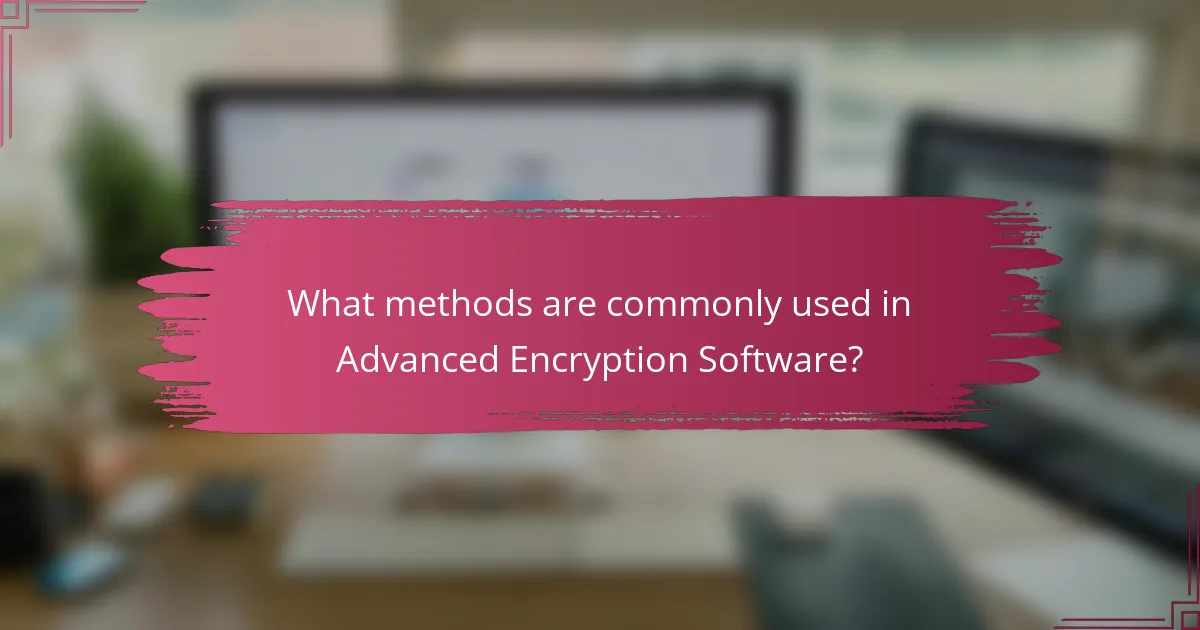
What methods are commonly used in Advanced Encryption Software?
Common methods used in Advanced Encryption Software include symmetric encryption, asymmetric encryption, and hashing. Symmetric encryption uses the same key for both encryption and decryption. This method is efficient and fast, making it suitable for large data sets. AES (Advanced Encryption Standard) is a widely adopted symmetric encryption algorithm. Asymmetric encryption employs a pair of keys, a public key for encryption and a private key for decryption. RSA (Rivest-Shamir-Adleman) is a prominent asymmetric encryption algorithm. Hashing transforms data into a fixed-size string of characters, providing data integrity. SHA (Secure Hash Algorithm) is a commonly used hashing method. These methods are essential for securing sensitive information in various applications.
What are the different types of encryption methods available?
The different types of encryption methods available include symmetric encryption, asymmetric encryption, and hashing. Symmetric encryption uses the same key for both encryption and decryption. Common symmetric algorithms include AES and DES. Asymmetric encryption uses a pair of keys, a public key for encryption and a private key for decryption. RSA and ECC are widely used asymmetric algorithms. Hashing transforms data into a fixed-size string, primarily for integrity verification. Examples of hashing algorithms include SHA-256 and MD5. Each method serves distinct purposes in securing data, ensuring confidentiality, and verifying integrity.
How does symmetric encryption differ from asymmetric encryption?
Symmetric encryption uses the same key for both encryption and decryption, while asymmetric encryption employs a pair of keys: a public key for encryption and a private key for decryption. Symmetric encryption is generally faster and more efficient for large data sets. It requires secure key management since the same key must be shared between parties. In contrast, asymmetric encryption enhances security by allowing anyone to encrypt data using the public key, while only the owner of the private key can decrypt it. This method is often used for secure key exchange and digital signatures. The difference in key management and performance makes symmetric encryption suitable for bulk data encryption, while asymmetric encryption is ideal for secure communications and authentication.
What are the use cases for hybrid encryption methods?
Hybrid encryption methods are used to combine the strengths of both symmetric and asymmetric encryption. They are commonly applied in securing communications over the internet. For instance, hybrid encryption is utilized in SSL/TLS protocols to protect data transmitted between web browsers and servers. This method allows for efficient data encryption while maintaining secure key exchange. Additionally, hybrid encryption is used in email encryption services to safeguard sensitive information. It ensures that only intended recipients can decrypt the message. Furthermore, hybrid encryption is beneficial in cloud storage solutions, enabling secure file sharing and storage. These use cases demonstrate the versatility and effectiveness of hybrid encryption in various digital security applications.
How do these methods affect data transmission and storage?
Advanced encryption methods significantly enhance data transmission and storage security. They protect sensitive information from unauthorized access during transfer. Encryption algorithms, such as AES, convert plaintext into ciphertext, making it unreadable without a decryption key. This process ensures that even if data is intercepted, it remains secure.
In terms of storage, encryption safeguards data at rest. It prevents unauthorized users from accessing stored information. For example, encrypted databases require authentication to decrypt data before use. This adds an additional layer of security, complying with regulations like GDPR and HIPAA.
The implementation of encryption can also impact performance. Encrypting and decrypting data may introduce latency in transmission speeds. However, the trade-off for enhanced security is often considered worthwhile. Overall, encryption methods are crucial for maintaining data integrity and confidentiality in both transmission and storage.
What role does encryption play in cloud storage solutions?
Encryption secures data stored in cloud storage solutions. It protects sensitive information from unauthorized access. By converting data into a coded format, encryption ensures that only authorized users can read it. This is crucial for compliance with regulations like GDPR and HIPAA. Studies show that 93% of organizations consider encryption essential for data protection. Additionally, encryption helps maintain data integrity during transmission. It prevents data breaches and enhances user trust in cloud services. Overall, encryption is a fundamental component of cloud storage security.
How does encryption safeguard data during transmission over networks?
Encryption safeguards data during transmission over networks by converting the information into a coded format. This process ensures that only authorized parties can access and read the data. Encryption uses algorithms to scramble the data, making it unreadable to anyone who intercepts it. Common encryption protocols include SSL/TLS and AES. These protocols employ complex mathematical functions to secure the data effectively. According to the National Institute of Standards and Technology (NIST), encryption is essential for protecting sensitive information in transit. By using encryption, organizations can prevent unauthorized access and data breaches during transmission.
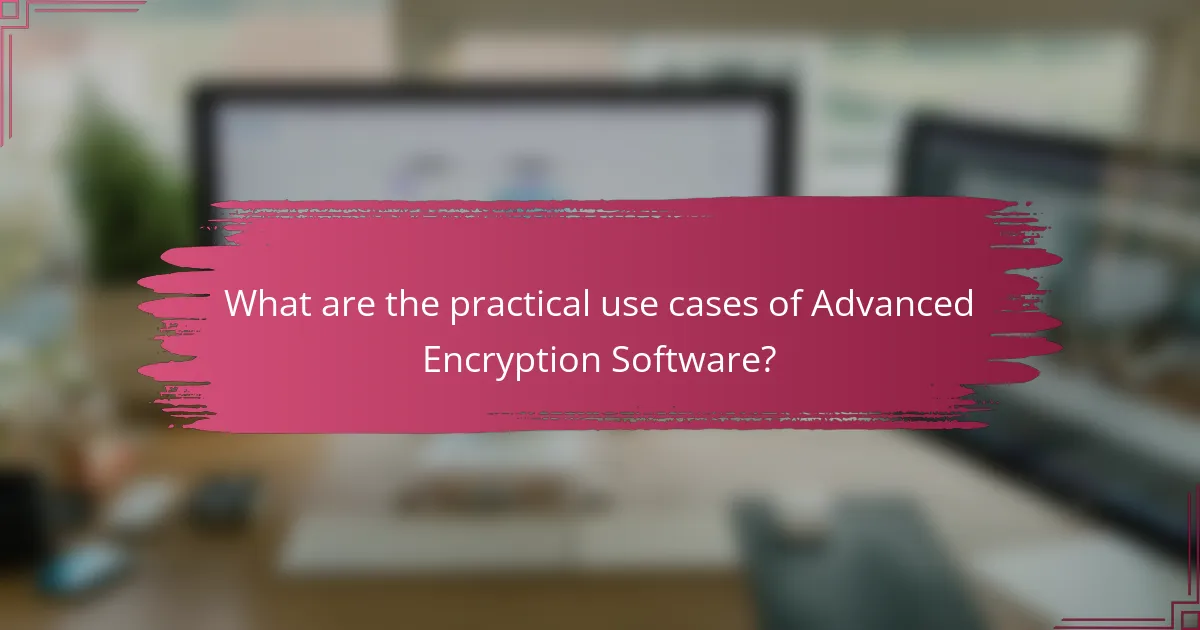
What are the practical use cases of Advanced Encryption Software?
Advanced Encryption Software is used for securing sensitive data. It protects information in various environments, including personal, corporate, and government sectors. One practical use case is encrypting files on personal computers to prevent unauthorized access. Businesses use encryption to secure customer data and comply with regulations like GDPR. Another application is encrypting email communications to ensure privacy. Advanced Encryption Software is also utilized in securing network communications, such as VPNs. Additionally, it is employed in protecting data stored in cloud services. These use cases demonstrate the versatility and necessity of encryption in safeguarding information.
In which industries is Advanced Encryption Software most utilized?
Advanced Encryption Software is most utilized in industries such as finance, healthcare, and government. The finance industry uses encryption to protect sensitive financial data and transactions. Healthcare organizations rely on encryption to safeguard patient records and comply with regulations like HIPAA. Government agencies employ encryption to secure classified information and communications. Additionally, the technology sector utilizes encryption to protect software and data integrity. These industries prioritize data security, making encryption a critical component of their operations.
How does Advanced Encryption Software benefit the healthcare sector?
Advanced Encryption Software enhances data security in the healthcare sector. It protects sensitive patient information from unauthorized access. This software ensures compliance with regulations like HIPAA. It prevents data breaches that can lead to financial losses. Encryption also facilitates secure communication between healthcare providers. It safeguards electronic health records during transmission and storage. The use of advanced encryption methods reduces the risk of identity theft. Overall, it fosters patient trust in digital health services.
What role does Advanced Encryption Software play in financial services?
Advanced Encryption Software plays a critical role in financial services by securing sensitive data. It protects customer information, transaction details, and financial records from unauthorized access. This software employs algorithms to encrypt data, making it unreadable without the correct decryption key. Financial institutions use it to comply with regulations like the Payment Card Industry Data Security Standard (PCI DSS). According to a report by Cybersecurity Ventures, cybercrime costs the global economy over $6 trillion annually. Advanced encryption mitigates these risks by safeguarding against data breaches and fraud. Additionally, it enhances customer trust by ensuring privacy and security in transactions.
What are some best practices for implementing Advanced Encryption Software?
Use strong encryption algorithms, such as AES-256, for robust security. Regularly update encryption software to protect against vulnerabilities. Implement key management best practices, ensuring keys are stored securely and rotated frequently. Conduct regular audits to assess encryption effectiveness and compliance. Train staff on encryption protocols and data protection measures. Ensure encryption is applied consistently across all data types. Test encryption systems regularly to identify potential weaknesses. Document encryption policies and procedures clearly for reference.
How can organizations ensure effective encryption key management?
Organizations can ensure effective encryption key management by implementing a comprehensive key management policy. This policy should define roles and responsibilities for key management tasks. Regular audits of key management practices help identify vulnerabilities. Organizations should use hardware security modules (HSMs) for secure key storage. Automated key rotation minimizes the risk of key compromise. Access controls must be enforced to limit who can manage keys. Training staff on key management best practices enhances overall security. According to the National Institute of Standards and Technology (NIST), proper key management is crucial for maintaining the confidentiality and integrity of encrypted data.
What common challenges should be addressed when using Advanced Encryption Software?
Common challenges when using Advanced Encryption Software include key management, performance issues, and user training. Key management is crucial as losing encryption keys can result in permanent data loss. Performance issues may arise due to the computational overhead of encryption, affecting system efficiency. User training is essential to ensure proper usage and avoid security breaches. Additionally, compatibility with existing systems can pose challenges, requiring careful integration planning. Regular updates and maintenance are necessary to address vulnerabilities and keep the software effective.
Advanced encryption software is a program designed to secure data by converting it into a coded format, protecting it from unauthorized access. The article explores key algorithms such as AES and RSA, detailing how these methods function to ensure data confidentiality and integrity during transmission and storage. It highlights the primary benefits of using advanced encryption software, including enhanced security, compliance with regulations like GDPR and HIPAA, and its applications across various industries, including finance and healthcare. Additionally, the article addresses best practices for effective encryption implementation and common challenges organizations face in utilizing this technology.
